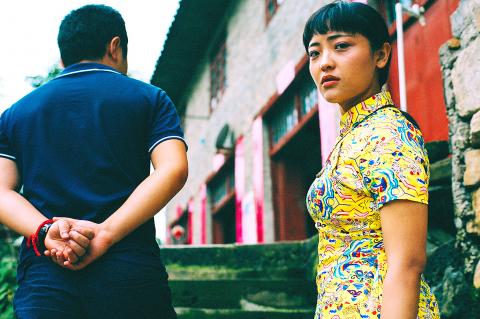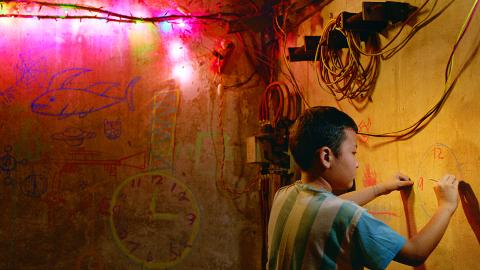For his arthouse debut, Kaili Blues (路邊野餐), writer and director Bi Gan (畢贛) shot the film in and around his hometown of Kaili, Guizhou Province in southern China, and cast locals, including his family and friends, as actors.
But the 26-year-old Chinese director does not attempt to represent physical reality or make a work of social realism, as many filmmakers of his generation have.
Instead, Bi’s mesmerizing debut defies logic. It explores cinema’s ability to hypnotize and entrance, and at the same time, is rooted in the life, land and the community where the director was born and raised.

Photo courtesy of Flash Forward Entertainment
The film centers on Chen Sheng, played by Chen Yongzhong (陳永忠), Bi’s uncle, an ex-con who now leads an honest life and runs a small country clinic. Chen is troubled that his half-brother Crazy Horse’s (Xie Lixun, 謝理循) has sold off his son Weiwei, and embarks on a journey to find his young nephew.
More cryptic than this synopsis suggests, the film is not driven by a narrative but channels of feeling. It respects the viewer’s intelligence and trusts us to understand its characters as we follow them from one mystical scene to another.
Still, much is uncertain. Guided by a sense of freedom and fluidity, the film abounds in otherworldly visions and enigmatic imagery. In one remarkable scene, a projected image of an upside-down train appears to crash through a damp, gloomy hut.

Photo courtesy of Flash Forward Entertainment
Occasionally, radio newscasts report sightings of a wild man, and every now and then, Chen cites evocative poetry in a monotonous tone as he leads us through his cinematic dream space.
The poems were written by Bi, from a collection entitled Roadside Picnic (路邊野餐).
In this dream, past, present and future intermingle and conflate, astonishingly manifested in a 40 minute-long extended take that follows Chen through rural Guizhou in search of his nephew.
The hand-held camera tracks characters on motorbikes, across narrow pathways, into homes and on a river ferry. Sometimes, it veers off to follow different players who appear and disappear from the frame.
During the journey, the protagonist encounters a variety of characters, notably the future version of Weiwei and a woman who could be Chen’s deceased wife.
The normal perceptions of time and space do not apply here. In his daring cinematic experiment, Bi creates a cyclic cosmos where memories, dreams and reality infiltrate and inform on each other.
The personal and the collective also intertwine. Throughout the film, the culture and tradition of the Miao ethnic minority, of whom Bi is a member, are alluded to.
At the same time, the nation’s shadowy past quietly emerges when Chen promises his senior medical colleague to deliver a cassette tape to an old lover he had known during the Cultural Revolution.
To be sure, there is a lot to accomplish in a film, but Bi has done it here with self-assurance and sincerity. Not a single moment feels pretentious or forced. It shows the making of a filmmaker in possession of a unique vision of rural China.
Kaili Blues has received numerous of international accolades, including the top award at the Festival of the Three Continents in France as well as the Best New Director prizes at the Locarno International Film Festival and Taiwan’s Golden Horse Awards last year.

June 2 to June 8 Taiwan’s woodcutters believe that if they see even one speck of red in their cooked rice, no matter how small, an accident is going to happen. Peng Chin-tian (彭錦田) swears that this has proven to be true at every stop during his decades-long career in the logging industry. Along with mining, timber harvesting was once considered the most dangerous profession in Taiwan. Not only were mishaps common during all stages of processing, it was difficult to transport the injured to get medical treatment. Many died during the arduous journey. Peng recounts some of his accidents in

What does the Taiwan People’s Party (TPP) in the Huang Kuo-chang (黃國昌) era stand for? What sets it apart from their allies, the Chinese Nationalist Party (KMT)? With some shifts in tone and emphasis, the KMT’s stances have not changed significantly since the late 2000s and the era of former president Ma Ying-jeou (馬英九). The Democratic Progressive Party’s (DPP) current platform formed in the mid-2010s under the guidance of Tsai Ing-wen (蔡英文), and current President William Lai (賴清德) campaigned on continuity. Though their ideological stances may be a bit stale, they have the advantage of being broadly understood by the voters.

Artifacts found at archeological sites in France and Spain along the Bay of Biscay shoreline show that humans have been crafting tools from whale bones since more than 20,000 years ago, illustrating anew the resourcefulness of prehistoric people. The tools, primarily hunting implements such as projectile points, were fashioned from the bones of at least five species of large whales, the researchers said. Bones from sperm whales were the most abundant, followed by fin whales, gray whales, right or bowhead whales — two species indistinguishable with the analytical method used in the study — and blue whales. With seafaring capabilities by humans

A short walk beneath the dense Amazon canopy, the forest abruptly opens up. Fallen logs are rotting, the trees grow sparser and the temperature rises in places sunlight hits the ground. This is what 24 years of severe drought looks like in the world’s largest rainforest. But this patch of degraded forest, about the size of a soccer field, is a scientific experiment. Launched in 2000 by Brazilian and British scientists, Esecaflor — short for “Forest Drought Study Project” in Portuguese — set out to simulate a future in which the changing climate could deplete the Amazon of rainfall. It is